
A hero is a real person or a main fictional character who, in the face of danger, combats adversity through feats of ingenuity, courage, or strength. The original hero type of classical epics did such things for the sake of glory and honor. Post-classical and modern heroes, on the other hand, perform great deeds or selfless acts for the common good instead of the classical goal of wealth, pride, and fame. The antonym of hero is villain. Other terms associated with the concept of hero may include good guy or white hat.

Edward Franklin Albee III was an American playwright known for works such as The Zoo Story (1958), The Sandbox (1959), Who's Afraid of Virginia Woolf? (1962), A Delicate Balance (1966), and Three Tall Women (1994). Some critics have argued that some of his work constitutes an American variant of what Martin Esslin identified and named the Theater of the Absurd. Three of his plays won the Pulitzer Prize for Drama and two of his other works won the Tony Award for Best Play.
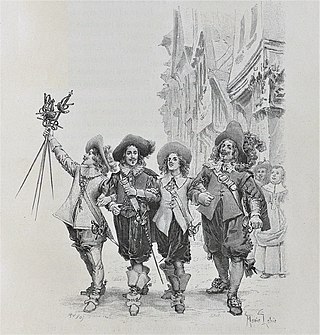
The Three Musketeers is a French historical adventure novel written in 1844 by French author Alexandre Dumas. As with some of his other works, he wrote it in collaboration with ghostwriter Auguste Maquet. It is in the swashbuckler genre, which has heroic, chivalrous swordsmen who fight for justice.

Harvey Forbes Fierstein is an American actor, playwright, and screenwriter, known for his distinctive gravelly voice. He is best known for his theater work in Torch Song Trilogy and Hairspray and film roles in Mrs. Doubtfire, Independence Day, and as the voice of Yao in Mulan and Mulan II. Fierstein won two Tony Awards, Best Actor in a Play and Best Play, for Torch Song Trilogy. He received his third Tony Award, Best Book of a Musical, for the musical La Cage aux Folles and his fourth, the Tony Award for Best Actor in a Musical, for playing Edna Turnblad in Hairspray, a role he revived in its live television event, Hairspray Live! Fierstein also wrote the books for the Tony Award-winning musicals Kinky Boots, Newsies, and Tony Award-nominated, Drama League Award-winner A Catered Affair. He was inducted into the American Theater Hall of Fame in 2007.
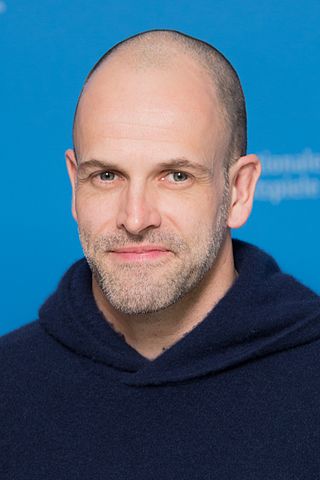
Jonathan Lee Miller is a British actor. He achieved early success for his portrayal of Simon "Sick Boy" Williamson in the dark comedy-drama film Trainspotting (1996) and as Dade Murphy in Hackers (1995) before earning further critical recognition for his performances in Afterglow (1997), Mansfield Park (1999), The Flying Scotsman (2006), Endgame (2009), and T2 Trainspotting (2017). For The Flying Scotsman he received a London Film Critics' Circle nomination for Actor of the Year. He was also part of the principal cast in the films Melinda and Melinda (2004), Dark Shadows (2012), and Byzantium (2013). He has appeared in several theatrical productions, most notably After Miss Julie and Frankenstein, the latter of which earned him an Olivier Award for Best Actor.

Eddie Asner was an American actor. He is best remembered for portraying Lou Grant during the 1970s and early 1980s, on both The Mary Tyler Moore Show and its spin-off series Lou Grant, making him one of the few television actors to portray the same character in both a comedy and a drama.
Rāhula was the only son of Siddhārtha Gautama, and his wife, princess Yaśodharā. He is mentioned in numerous Buddhist texts, from the early period onward. Accounts about Rāhula indicate a mutual impact between Prince Siddhārtha's life and the lives of his family members. According to the Pāli tradition, Rāhula was born on the day of Prince Siddhārtha's renunciation, and was therefore named Rāhula, meaning a fetter on the path to enlightenment. According to the Mūlasarvāstivāda tradition, and numerous other later sources, however, Rāhula was only conceived on the day of Prince Siddhartha's renunciation, and was born six years later, when Prince Siddhārtha became enlightened as the Buddha. This long gestation period was explained by bad karma from previous lives of both Yaśodharā and of Rāhula himself, although more naturalistic reasons are also given. As a result of the late birth, Yaśodharā needed to prove that Rāhula was really Prince Siddhārtha's son, which she eventually did successfully by an act of truth. Historian H.W. Schumann has argued that Prince Siddhārtha conceived Rāhula and waited for his birth, to be able to leave the palace with the king and queen's permission, but Orientalist Noël Péri considered it more likely that Rāhula was born after Prince Siddhārtha left his palace.
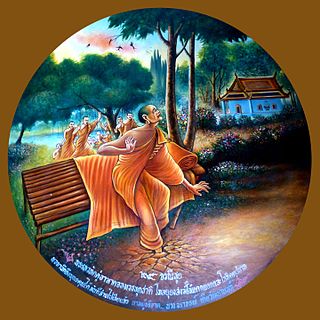
Devadatta was by tradition a Buddhist monk, cousin and brother-in-law of Gautama Siddhārtha. The accounts of his life vary greatly, but he is generally seen as an evil and divisive figure in Buddhism, who led a breakaway group in the earliest days of the religion.

The casualties of the Napoleonic Wars (1803–1815), direct and indirect, are broken down below:

Śāriputra was one of the top disciples of the Buddha. He is considered the first of the Buddha's two chief male disciples, together with Maudgalyāyana. Śāriputra had a key leadership role in the ministry of the Buddha and is considered in many Buddhist schools to have been important in the development of the Buddhist Abhidharma. He frequently appears in Mahayana sutras, and in some sutras, is used as a counterpoint to represent the Hinayana school of Buddhism.

The Buddha of Suburbia (1990) is a novel by English author Hanif Kureishi, which won the Whitbread Award for the best first novel. The novel has been translated into 20 languages and was also made into a four-part drama series by the BBC in 1993. The soundtrack for the BBC drama was written and performed by David Bowie, who was a fan of the novel and shared the same Bromley home town as author Kureishi.
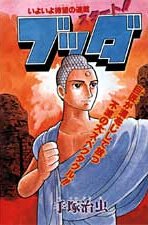
Buddha is a manga drawn by Osamu Tezuka and is Tezuka's unique interpretation of the life of Gautama Buddha, the founder of Buddhism. The critically acclaimed series is often referred to as a visually explicit yet humorous and thought-provoking portrayal of the Buddha's life; the series itself has become a staple text in Buddhist temples for young adults and teens to learn about the Buddha's life. The series began in September 1972 and ended in December 1983, as one of Tezuka's last epic manga works.
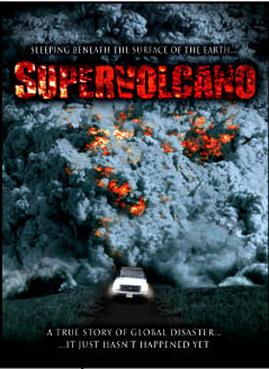
Supervolcano is a 2005 disaster drama television film directed by Tony Mitchell and written by Edward Canfor-Dumas. It is based on the speculated and potential eruption of the volcanic Yellowstone Caldera, located in Yellowstone National Park. The film stars an ensemble cast consisting of Michael Riley, Gary Lewis, Shaun Johnston, Adrian Holmes, Jennifer Copping, Rebecca Jenkins, Tom McBeath, Robert Wisden, Susan Duerden, Jane McLean, Sam Charles, and Kevin McNulty.

Jack Louis Fox is a British actor. He is part of the Fox family. He is the fourth son of James Fox and his late wife Mary, his uncles are Robert and Edward Fox. Fox began his career in television starring in the critically acclaimed Fresh Meat (2011). Roles in the Golden Globe-nominated National Geographic series Genius, BBC One’s Privates, Upstart Crow, NBC's Dracula, ITV’s Mr. Selfridge, Lewis, Midsomer Murders, and Crackle’s Snatch followed. He played a leading Role in Sky Atlantic's Riviera (2019), which smashed records for their biggest debut series ever, making it their most downloaded show in history. He continues to play a lead role in Andrew Davies's ITV/Masterpiece (PBS) produced Sanditon (2020–present). Most recently he can be seen in BBC One's drama Cheaters (2022).

The miracles of Gautama Buddha refers to supernatural feats and abilities attributed to Gautama Buddha by the Buddhist scriptures. The feats are mostly attributed to supranormal powers gained through meditation, rather than divine miracles. Supranormal powers the historic Buddha was said to have possessed and exercised include the six higher knowledges (abhiññā): psychic abilities (iddhi-vidhā), clairaudience (dibba-sota), telepathy (ceto-pariya), recollection of one's own past lives (pubbe-nivāsanussati), seeing the past lives and rebirths of others (dibba-cakkhu), and the extinction of mental intoxicants (āsavakkhaya). Miracles found in Mahayana sutras generally play a more direct role in illustrating certain doctrines than miracles found in non-Mahayana Buddhist texts. Apart from texts, several of the miracles are often shown in scenes of the life of Buddha in art.
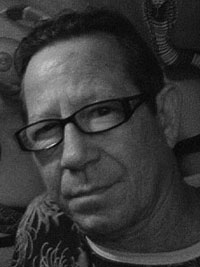
Richard K. Diran is an American adventurer and gemologist who has also been a painter, trader in gemstones, restaurateur, and art dealer. He is best known as the author and photographer of the book The Vanishing Tribes of Burma, which was published in 1997.

Joselyn Dumas is a Ghanaian television host and actress. In 2014 she starred in A Northern Affair, a role that earned her a Ghana Movie Award and an Africa Movie Academy Award nomination for Best Actress.

The Black Count: Glory, Revolution, Betrayal, and the Real Count of Monte Cristo is a 2012 biography of General Thomas-Alexandre Dumas written by Tom Reiss. The book presents the life and career of Dumas as a soldier and officer during the French Revolution, as well as his military service in Italy during the French Revolutionary Wars and later in Egypt under Napoleon. Reiss offers insight into slavery and the life of a man of mixed race during the French Colonial Empire. He also reveals how Dumas's son – author Alexandre Dumas – viewed his father, who served as the inspiration for some of his novels, including The Count of Monte Cristo (1844) and The Three Musketeers (1844).
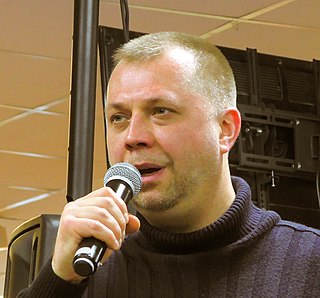
Alexander Yurevich Borodai is a Russian member of the State Duma of the 8th convocation for the party United Russia. Borodai was Prime Minister of the self-proclaimed Donetsk People's Republic in 2014 after the Donetsk People's Republic declared its independence from Ukraine on 12 May 2014, Borodai was appointed as Prime Minister by the republic's Supreme Council on 14 May 2014. Borodai, a Russian citizen, had earlier worked as a political adviser to Sergey Aksyonov, the prime minister of the Republic of Crimea. On 7 August 2014, Borodai announced his resignation. He was succeeded by Alexander Zakharchenko; under Zakharchenko, Borodai became Deputy Prime Minister.

The Great Renunciation or Great Departure is the traditional term for the departure of Gautama Buddha from his palace at Kapilavastu to live a life as an ascetic. It is called the Great Renunciation because it is regarded as a great sacrifice. Most accounts of this event can be found in post-canonical Buddhist texts from several Buddhist traditions, which are the most complete. These are, however, of a more mythological nature than the early texts. They exist in Pāli, Sanskrit and Chinese language.


















